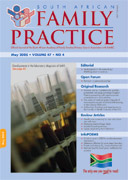CPD: Health Care Screening for Men Who Have Sex with Men.
Abstract
Men who have sex with men often do not reveal their sexual practices or sexual orientation to their physician. Lack of disclosure from the patient, discomfort or inadequate training of the physician, perceived or real hostility from medical staff, and insufficient screening guidelines limit preventive care. Because of greater societal stresses, lack of emotional support, and practice of unsafe sex, men who have sex with men are at increased risk for sexually transmitted diseases (including human immunodeficiency virus infection), anal cancer, psychological and behavioural disorders, drug abuse, and eating disorders. Recent trends indicate an increasing rate of sexual risk-taking among these men, particularly if they are young. Periodic screening should include a yearly health risk and physical assessment, as well as a thorough sexual and psychological history. The physician should ask questions about sexual orientation in a non-judgemental manner; furthermore, confidentiality should be addressed and maintained. Office practices and staff should be similarly non-judgemental, with confidentiality maintained. Targeted screening for sexually transmitted diseases, depression, substance abuse, and other disorders should be performed routinely. Screening guidelines, while inconsistent and subject to change, offer some useful suggestions for the care of men who have sex with men. (SA Fam Pract 2005;47(4): 34-39) (Reprinted from: Am Fam Physician 2004;69(May):2149-56. Copyright© 2004 American Academy of Family Physicians.) Permission from the AAFP was granted to publish this article in the hardcopy only. Kindly refer to www.aafp.org or subscribe to the hardcopy of South African Family Practice.
Published
2005-05-01
Issue
Section
Review Articles
By submitting manuscripts to SAFP, authors of original articles are assigning copyright to the South African Academy of Family Physicians. Copyright of review articles are assigned to the Publisher, Medpharm Publications (Pty) Ltd, unless otherwise specified. Authors may use their own work after publication without written permission, provided they acknowledge the original source. Individuals and academic institutions may freely copy and distribute articles published in SAFP for educational and research purposes without obtaining permission.

